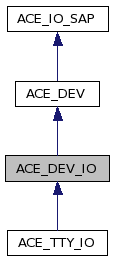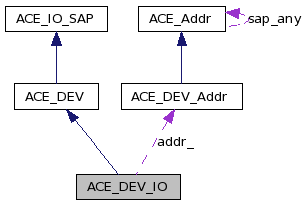Read/Write operations on Devices. More...
#include <DEV_IO.h>


Public Member Functions | |
| ACE_DEV_IO (void) | |
| Default constructor. | |
| ssize_t | send (const void *buf, size_t n) const |
| send upto n bytes in buf. | |
| ssize_t | recv (void *buf, size_t n) const |
| Recv upto n bytes in buf. | |
| ssize_t | send_n (const void *buf, size_t n) const |
| Send n bytes, keep trying until n are sent. | |
Friends | |
| class | ACE_DEV_Connector |
I/O operations | |
|
buf is the buffer to write from or receive into. len is the number of bytes to transfer. The timeout parameter in the following methods indicates how long to blocking trying to transfer data. If timeout == 0, then the call behaves as a normal send/recv call, i.e., for blocking sockets, the call will block until action is possible; for non-blocking sockets, EWOULDBLOCK will be returned if no action is immediately possible. If timeout != 0, the call will wait until the relative time specified in *timeout elapses. The "_n()" I/O methods keep looping until all the data has been transferred. These methods also work for sockets in non-blocking mode i.e., they keep looping on EWOULDBLOCK. timeout is used to make sure we keep making progress, i.e., the same timeout value is used for every I/O operation in the loop and the timeout is not counted down. The return values for the "*_n()" methods match the return values from the non "_n()" methods and are specified as follows:
On partial transfers, i.e., if any data is transferred before timeout/error/EOF, bytes_transferred will contain the number of bytes transferred. | |
| typedef ACE_DEV_Addr | PEER_ADDR |
| Declare the dynamic allocation hooks. | |
| ACE_ALLOC_HOOK_DECLARE | |
| Declare the dynamic allocation hooks. | |
| ACE_DEV_Addr | addr_ |
| Address of device we are connected to. | |
| ssize_t | recv_n (void *buf, size_t n, const ACE_Time_Value *timeout=0, size_t *bytes_transferred=0) const |
| Declare the dynamic allocation hooks. | |
| ssize_t | send (const iovec iov[], size_t n) const |
| Send iovecs via <writev>. | |
| ssize_t | recv (iovec iov[], size_t n) const |
| Recv iovecs via <readv>. | |
| ssize_t | send (size_t n,...) const |
| ssize_t | recv (size_t n,...) const |
| ssize_t | send (const void *buf, size_t n, ACE_OVERLAPPED *overlapped) const |
| Send n bytes via Win32 WriteFile using overlapped I/O. | |
| ssize_t | recv (void *buf, size_t n, ACE_OVERLAPPED *overlapped) const |
| Recv n bytes via Win32 ReadFile using overlapped I/O. | |
| void | dump (void) const |
| Dump the state of an object. | |
| int | get_local_addr (ACE_DEV_Addr &) const |
| Return the local endpoint address. | |
| int | get_remote_addr (ACE_DEV_Addr &) const |
Read/Write operations on Devices.
Definition at line 40 of file DEV_IO.h.
| typedef ACE_DEV_Addr ACE_DEV_IO::PEER_ADDR |
| ACE_DEV_IO::ACE_DEV_IO | ( | void | ) |
Default constructor.
Definition at line 53 of file DEV_IO.cpp.
{
ACE_TRACE ("ACE_DEV_IO::ACE_DEV_IO");
}
| void ACE_DEV_IO::dump | ( | void | ) | const |
Dump the state of an object.
Reimplemented from ACE_DEV.
Definition at line 40 of file DEV_IO.cpp.
{
#if defined (ACE_HAS_DUMP)
ACE_TRACE ("ACE_DEV_IO::dump");
ACE_DEBUG ((LM_DEBUG, ACE_BEGIN_DUMP, this));
this->addr_.dump ();
ACE_DEBUG ((LM_DEBUG, ACE_END_DUMP));
#endif /* ACE_HAS_DUMP */
}
| int ACE_DEV_IO::get_local_addr | ( | ACE_DEV_Addr & | addr | ) | const |
Return the local endpoint address.
Definition at line 20 of file DEV_IO.cpp.
| int ACE_DEV_IO::get_remote_addr | ( | ACE_DEV_Addr & | addr | ) | const |
Return the address of the remotely connected peer (if there is one).
Definition at line 32 of file DEV_IO.cpp.
| ssize_t ACE_DEV_IO::recv | ( | void * | buf, | |
| size_t | n, | |||
| ACE_OVERLAPPED * | overlapped | |||
| ) | const [inline] |
Recv n bytes via Win32 ReadFile using overlapped I/O.
Definition at line 88 of file DEV_IO.inl.
{
ACE_TRACE ("ACE_DEV_IO::recv");
return ACE_OS::read (this->get_handle (), (char *) buf, n,
overlapped);
}
| ssize_t ACE_DEV_IO::recv | ( | void * | buf, | |
| size_t | n | |||
| ) | const [inline] |
Recv upto n bytes in buf.
Definition at line 57 of file DEV_IO.inl.
{
ACE_TRACE ("ACE_DEV_IO::recv");
return ACE_OS::read (this->get_handle (), (char *) buf, n);
}
| ssize_t ACE_DEV_IO::recv | ( | size_t | n, | |
| ... | ||||
| ) | const |
This is an interface to readv, that doesn't use the struct iovec explicitly. The ... can be passed as an arbitrary number of (char *ptr, int len) tuples. However, the count N is the *total* number of trailing arguments, *not* a couple of the number of tuple pairs!
Definition at line 101 of file DEV_IO.cpp.
{
ACE_TRACE ("ACE_DEV_IO::recv");
va_list argp;
int total_tuples = static_cast<int> (n / 2);
iovec *iovp;
#if defined (ACE_HAS_ALLOCA)
iovp = (iovec *) alloca (total_tuples * sizeof (iovec));
#else
ACE_NEW_RETURN (iovp,
iovec[total_tuples],
-1);
#endif /* !defined (ACE_HAS_ALLOCA) */
va_start (argp, n);
for (int i = 0; i < total_tuples; i++)
{
iovp[i].iov_base = va_arg (argp, char *);
iovp[i].iov_len = va_arg (argp, int);
}
ssize_t result = ACE_OS::readv (this->get_handle (), iovp, total_tuples);
#if !defined (ACE_HAS_ALLOCA)
delete [] iovp;
#endif /* !defined (ACE_HAS_ALLOCA) */
va_end (argp);
return result;
}
| ssize_t ACE_DEV_IO::recv | ( | iovec | iov[], | |
| size_t | n | |||
| ) | const [inline] |
Recv iovecs via <readv>.
Definition at line 71 of file DEV_IO.inl.
{
ACE_TRACE ("ACE_DEV_IO::recv");
return ACE_OS::readv (this->get_handle (), iov, static_cast<int> (n));
}
| ssize_t ACE_DEV_IO::recv_n | ( | void * | buf, | |
| size_t | n, | |||
| const ACE_Time_Value * | timeout = 0, |
|||
| size_t * | bytes_transferred = 0 | |||
| ) | const [inline] |
Declare the dynamic allocation hooks.
Definition at line 27 of file DEV_IO.inl.
{
ACE_TRACE ("ACE_DEV_IO::recv_n");
#if defined (ACE_WIN32)
ACE_UNUSED_ARG (timeout);
return ACE::read_n (this->get_handle (),
buf,
n,
bytes_transferred);
#else
return ACE::recv_n (this->get_handle (),
buf,
n,
timeout,
bytes_transferred);
#endif /*ACE_WIN32*/
}
| ssize_t ACE_DEV_IO::send | ( | size_t | n, | |
| ... | ||||
| ) | const |
Send N char *ptrs and int lengths. Note that the char *'s precede the ints (basically, an varargs version of writev). The count N is the *total* number of trailing arguments, *not* a couple of the number of tuple pairs!
Definition at line 64 of file DEV_IO.cpp.
{
ACE_TRACE ("ACE_DEV_IO::send");
va_list argp;
int total_tuples = static_cast<int> (n / 2);
iovec *iovp;
#if defined (ACE_HAS_ALLOCA)
iovp = (iovec *) alloca (total_tuples * sizeof (iovec));
#else
ACE_NEW_RETURN (iovp,
iovec[total_tuples],
-1);
#endif /* !defined (ACE_HAS_ALLOCA) */
va_start (argp, n);
for (int i = 0; i < total_tuples; i++)
{
iovp[i].iov_base = va_arg (argp, char *);
iovp[i].iov_len = va_arg (argp, int);
}
ssize_t result = ACE_OS::writev (this->get_handle (), iovp, total_tuples);
#if !defined (ACE_HAS_ALLOCA)
delete [] iovp;
#endif /* !defined (ACE_HAS_ALLOCA) */
va_end (argp);
return result;
}
| ssize_t ACE_DEV_IO::send | ( | const iovec | iov[], | |
| size_t | n | |||
| ) | const [inline] |
Send iovecs via <writev>.
Definition at line 64 of file DEV_IO.inl.
{
ACE_TRACE ("ACE_DEV_IO::send");
return ACE_OS::writev (this->get_handle (), iov, static_cast<int> (n));
}
| ssize_t ACE_DEV_IO::send | ( | const void * | buf, | |
| size_t | n, | |||
| ACE_OVERLAPPED * | overlapped | |||
| ) | const [inline] |
Send n bytes via Win32 WriteFile using overlapped I/O.
Definition at line 78 of file DEV_IO.inl.
{
ACE_TRACE ("ACE_DEV_IO::send");
return ACE_OS::write (this->get_handle (),
(const char *) buf, n,
overlapped);
}
| ssize_t ACE_DEV_IO::send | ( | const void * | buf, | |
| size_t | n | |||
| ) | const [inline] |
send upto n bytes in buf.
Definition at line 50 of file DEV_IO.inl.
{
ACE_TRACE ("ACE_DEV_IO::send");
return ACE_OS::write (this->get_handle (), (const char *) buf, n);
}
| ssize_t ACE_DEV_IO::send_n | ( | const void * | buf, | |
| size_t | n | |||
| ) | const [inline] |
Send n bytes, keep trying until n are sent.
Definition at line 17 of file DEV_IO.inl.
{
ACE_TRACE ("ACE_DEV_IO::send_n");
return ACE::write_n (this->get_handle (), buf, n);
}
friend class ACE_DEV_Connector [friend] |
ACE_DEV_Addr ACE_DEV_IO::addr_ [private] |
 1.7.0
1.7.0